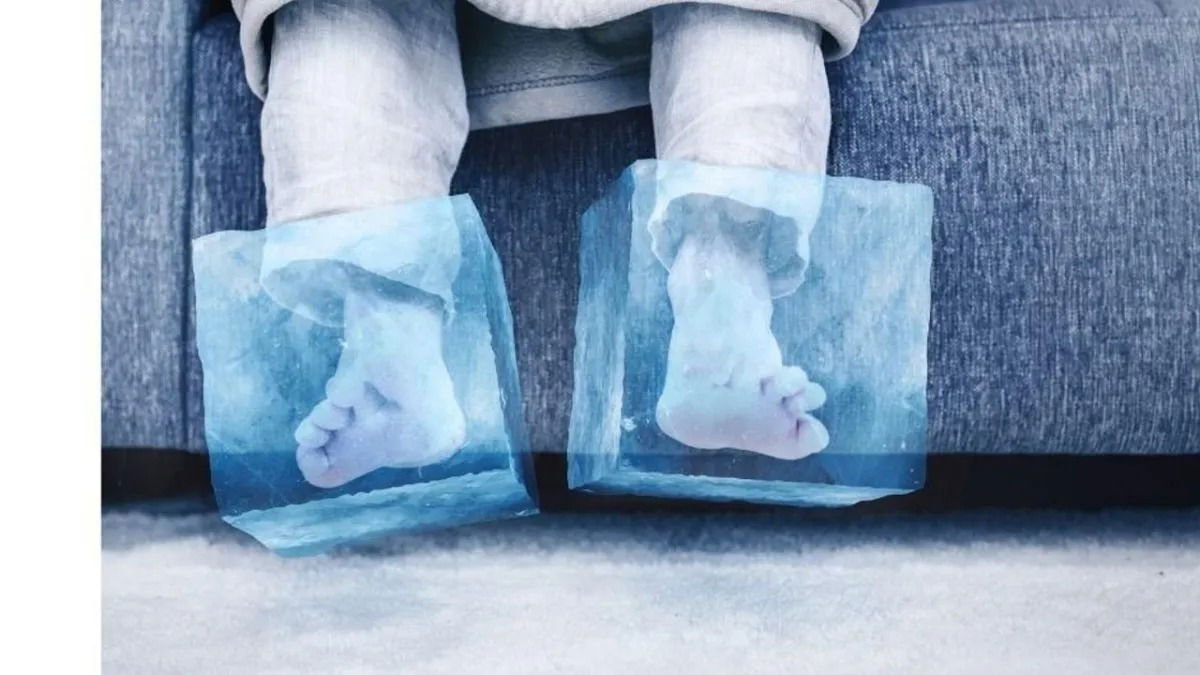
It’s common to feel a bit colder during the winter or after being in air-conditioned spaces for an extended period.
But if you frequently feel cold—even on warm days—or find yourself layering up while others are comfortable, or if your hands and feet are always freezing, there could be an underlying issue.
Experts, including Sami Karjalainen from Finland’s VTT Technical Research Centre, explain that women tend to be more sensitive to changes in temperature than men. This is partly because women typically generate less body heat, with their body temperatures ranging from 3 to 10 percent lower than men’s. This difference stems from the fact that men usually have more calorie-burning muscle mass, which produces more heat.
While biology offers one explanation, there are many other potential reasons why someone might constantly feel cold, ranging from health conditions to lifestyle habits such as sleep, diet, and exercise.
10 Reasons You Might Always Feel Cold
1. Poor Blood Circulation
When circulation is poor, red blood cell levels can be low. Since these cells transport oxygen, your body prioritizes sending oxygen to vital organs like the brain, often leaving the hands and feet cold.
2. Iron Deficiency
Iron supports the flow of oxygen via red blood cells. A shortage can result in chronic coldness and may also be linked to thyroid issues.

3. Thyroid Disorders
According to the American Thyroid Association, 1 in 8 women in the U.S. will develop a thyroid condition, and many are unaware of it. An underactive thyroid (hypothyroidism) slows down metabolism, reducing the body’s ability to generate heat.
4. Low Body Weight
Being underweight means less fat insulation and a slower metabolism, which both contribute to an inability to retain warmth.
5. Not Enough Healthy Fats
Despite common beliefs, healthy fats (like those found in nuts and avocados) are essential for maintaining body temperature. Cravings for hearty, fatty foods in cold weather are your body’s way of seeking warmth.
6. Vitamin B12 Deficiency
This vitamin is essential for producing red blood cells. Even if you consume enough B12 through foods like dairy, eggs, fish, and poultry, absorption issues could still cause a deficiency.

7. Raynaud’s Syndrome
This condition causes parts of the body, often fingers and toes, to feel numb and cold in response to chilly environments or stress. It occurs when small arteries constrict, limiting blood flow. If you suspect you have this, consult a doctor for diagnosis and treatment.
8. Low Protein Intake
Protein boosts thermogenesis (the body’s heat production after eating), so if your diet lacks enough protein, your internal temperature may drop more easily.
9. Poor Sleep Quality
Sleep deprivation affects the hypothalamus—the brain’s temperature regulation center—and slows down metabolism, which can both lead to feeling cold.

10. Dehydration
Not drinking enough water can lower blood pressure, reduce circulation, and accelerate heat loss, leaving you feeling chilly.
Cold feet can indicate 6 health problems

Feeling cold feet is common, especially on colder days. Sometimes, all it takes is putting on a pair of socks or wrapping yourself in a blanket to solve the problem. However, when this sensation is constant or happens for no apparent reason, it is a warning from your body.
In this article, I explain in simple terms the six main problems that can be behind this discomfort and how to identify the signs.
Why do feet get cold?
The human body is intelligent and prioritizes keeping vital organs warm. When we are exposed to the cold, blood is redirected to the torso, leaving the extremities, such as hands and feet, less warm.
However, cold feet are not always related to the environment. Problems with blood circulation, nerves, or even hormonal changes can affect the temperature of the extremities.
If you notice that your feet are often cold, even in warm places, it is worth paying attention to other symptoms.

1. Poor circulation: The most common culprit
Poor circulation is one of the most common causes of cold feet. When blood does not circulate efficiently throughout the body, the extremities, such as the feet, do not receive enough heat.
This problem occurs for a variety of reasons, such as a sedentary lifestyle, smoking, obesity, or even cardiovascular disease.
To improve circulation, simple activities such as walking or stretching can help a lot. In more serious cases, it may be necessary to see a doctor to investigate the cause.
2. Anemia: When the body lacks iron
Anemia is another common factor linked to cold feet. This condition occurs when the body does not have enough healthy red blood cells to carry oxygen. With less oxygen circulating, the feet and hands may feel colder.
Causes of anemia include a lack of iron or vitamin B12 or even chronic diseases.

3. Diabetes: Watch out for neuropathy
Diabetes is a disease that affects the way your body processes blood sugar. When it is not well controlled, excess sugar can damage your nerves, especially in your extremities, such as your feet.
This condition, called diabetic neuropathy, can cause abnormal sensations such as tingling, numbness, or a feeling of intense coldness in the feet.
4. Hypothyroidism: Slow metabolism, cold feet
The thyroid is a small gland in the neck that produces hormones that regulate metabolism. When the thyroid is working less than it should, the entire body slows down, including the body’s ability to maintain its temperature.
If you suspect hypothyroidism, see a doctor. Diagnosis is made through blood tests, and treatment is usually simple, with hormone replacement therapy.
5. Raynaud’s phenomenon: Fingers that change color
Raynaud’s phenomenon is a condition that affects the blood vessels in the hands and feet, causing them to constrict in response to cold or stress. This reduces blood flow, leaving the fingers pale, blue, and, in some cases, even numb.
After the episode, the fingers may become red and painful as the blood returns to the bloodstream. Although not serious, Raynaud’s can be associated with other diseases, such as lupus or rheumatoid arthritis.
Protecting your hands and feet from the cold and avoiding stressful situations helps control symptoms.

6. Multiple sclerosis: An impact on the nerves
Multiple sclerosis is an autoimmune disease that affects the central nervous system, interfering with communication between the brain and the body. One of the symptoms is dysesthesia, or abnormal sensations such as intense heat or cold in the feet and hands.
This type of discomfort occurs because damaged nerves have difficulty transmitting temperature signals.
Treatment varies depending on symptoms and may include medications to relieve discomfort.
When to seek medical help?
If cold feet are persistent and accompanied by other symptoms, such as pain, swelling, or changes in skin color, it’s time to see a doctor.
While cold feet are often nothing to worry about, identifying the underlying cause can help prevent more serious problems and improve your quality of life.

Conclusion
Cold feet are more than just a nuisance: they can be a warning sign of health conditions that deserve attention. Knowing the possible causes is the first step to taking better care of yourself and seeking help when necessary.
Whatever the reason, the important thing is to listen to your body and take action to maintain your health. After all, no one deserves to spend the whole day with frozen feet, right?















